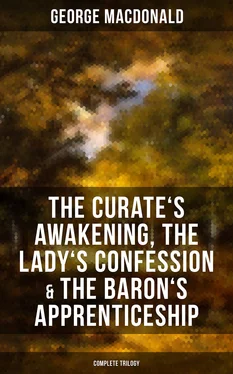She buried her face on his pillow, and Leopold uttered "a great and exceeding bitter cry." Her hand was on his mouth instantly, and her sobs ceased, while the tears kept flowing down her white face.
"Just think, Poldie," she said, in a voice which she seemed to have borrowed in her need from some one else, "—just think a moment! What if there should be some help in the great wide universe—somewhere, for as wide as it is—a heart that feels for us both, as my heart feels for you, Poldie! Oh! oh! wouldn't it be grand? Wouldn't it be lovely to be at peace again, Poldie? If there should be somebody somewhere who could take this gnawing serpent from my heart!"—She pulled wildly at her dress.—"'Come unto me,' he said, 'all ye that labour and are heavy laden, and I will give you rest.' That's what he said:—oh! if it could be true!"
"Surely it is—for you, best of sisters," cried Leopold; "but what has it to do with me? Nothing. She is DEAD—I killed her. Even if God were to raise her to life again, HE could not make it that I didn't drive the knife into her heart! Give ME rest!—why there's the hand that did it! O my God! my God!" cried the poor youth, and stared at his thin wasted hand, through which the light shone red, as at a conscious evil thing that had done the deed, and was still stained with its signs.
"God CAN'T be very angry with you, Poldie," sobbed Helen, feeling about blindly in the dark forest of her thoughts for some herb of comfort, and offering any leaf upon which her hand fell first.
"Then he ain't fit to be God!" cried Leopold fiercely. "I wouldn't have a word to say to a God that didn't cut a man in pieces for such a deed! Oh Helen, she was so lovely!—and what is she now?"
"Surely if there were a God, he would do something to set it right somehow! I know if I was God, Poldie, I should find some way of setting you up again, my darling. You ain't half as bad as you make yourself out."
"You had better tell that to the jury, Helen, and see how they will take it," said Leopold contemptuously.
"The jury!" Helen almost screamed. "What do you mean, Poldie?"
"Well!" returned Leopold, in a tone of justification, but made no further answer to her question. "All God can do to set it right," he resumed, after a pause, "is to damn me for ever and ever, as one of the blackest creatures in creation."
"THAT I don't believe, anyhow!" returned Helen with equal vehemence and indefiniteness.
And for the first time, George Bascombe's teachings were a comfort to her. It was all nonsense about a God. As to her brother's misery, it had no source but that to which Shakespeare attributed the misery of Macbeth—and who should know better than Shakespeare?—the fear, namely, of people doing the like to himself! But straightway thereupon—horrible thought!—she found herself—yes! it was in her—call it thought, or call it feeling, it was hers!—she found herself despising her poor crushed brother! disgusted with him! turning from him, not even in scorn of his weakness, but in anger at what he had brought upon her! It was but a flash of the lightning of hell: one glance of his great, troubled, appealing, yet hopeless eyes, vague with the fogs that steamed up from the Phlegethon within him, was enough to turn her anger at him into hate of herself who had stabbed his angel in her heart. Then in herself she knew that all murderers are not of Macbeth's order, and that all remorse is not for oneself.
But where was the God to be found who could and MIGHT help in the wretched case? How were they to approach him? Or what could he do for them? Were such a being to assure Leopold that no hurt should come to him—even that he thought little of the wrong that he had done—would that make his crushed heart begin to swell again with fresh life? would that bring back Emmeline from the dark grave and the worms to the sunny earth and the speech of men? And whither, yet farther, he might have sent her, she dared not think. And Leopold was not merely at strife with himself, but condemned to dwell with a self that was loathsome to him. She no longer saw any glimmer of hope but such as lay in George's doctrine of death. If there was no helper who could clean hearts and revive the light of life, then welcome gaunt death! let the grim-mouthed skeleton be crowned at every feast!
CHAPTER XVII.
LET US PRAY!
Table of Contents
That was the sole chink in the prison where these two sat immured alone from their kind—unless, indeed, the curate might know of another.
One thing Helen had ground for being certain of—that the curate would tell them no more than he knew. Even George Bascombe, who did not believe one thing he said, counted him an honest man! Might she venture to consult him, putting the case as of a person who had done very wrong—say stolen money or committed forgery or something? Might she not thus gather a little honey of comfort and bring it home to Leopold?
Thinking thus and thus she sat silent; and all the time the suffering eyes were fixed upon her face, looking for no comfort, but finding there all they ever had of rest.
"Are you thinking about the sermon, Helen?" he asked. "What was it you were telling me about it just now? Who preached it?"
"Mr. Wingfold," she answered listlessly.
"Who is Mr. Wingfold?"
"Our curate at the Abbey."
"What sort of man is he?"
"Oh, a man somewhere about thirty—a straightforward, ordinary kind of man."
"Ah!" said Leopold—then added after a moment—"I was hoping he might be an old man, with a grey head, like the brahmin who used to teach me Sanscrit.—I wish I had treated him better, poor old fellow! and learned a little more."
"What does it matter about Sanscrit? Why should you make troubles of trifles?" said Helen, whose trials had at last begun to undermine her temper.
"It was not of the Sanscrit, but the moonshee I was thinking," answered Leopold mildly.
"You darling!" cried Helen, already repentant. But with the revulsion she felt that this state of things could not long continue—she must either lose her senses, or turn into something hateful to herself: the strain was more than she could bear. She MUST speak to somebody, and she would try whether she could not approach the subject with Mr. Wingfold.
But how was she to see him? It would be awkward to call upon him at his lodgings, and she must see him absolutely alone to dare a whisper of what was on her mind.
As she thus reflected, the thought of what people would say, were it remarked that she contrived to meet the curate, brought a shadow of scorn upon her face. Leopold saw the expression, and, sensitive as an ailing woman, said,
"Helen, what HAVE I done to make you look like that?"
"How did I look, my Poldie?" she asked, turning on him eyes like brimming wells of love and tenderness.
"Let me see," answered Leopold; and after a moment's thought replied, "As Milton's Satan might have looked if Mammon had counselled him to make off with the crown-jewels instead of declaring war."
"Ah, Poldie!" cried Helen, delighted at the stray glance of sunshine, and kissing him as she spoke, "you must really be better! I'll tell you what!" she exclaimed joyfully, as a new thought struck her: "As soon as you are able, we will set out for New York—to pay Uncle Tom a visit of course! but we shall never be seen or heard of again. At New York we will change our names, cross to San Francisco, and from there sail for the Sandwich Islands. Perhaps we may be able to find a little one to buy, just big enough for us two; and you shall marry a nice native——"
Her forced gaiety gave way. She burst out weeping afresh, and throwing her arms round him, sobbed—
"Poldie, Poldie! you can pray: cry to God to help us somehow or other; and if there be no God to hear us, then let us die together. There are easy ways of it, Poldie."
Читать дальше












